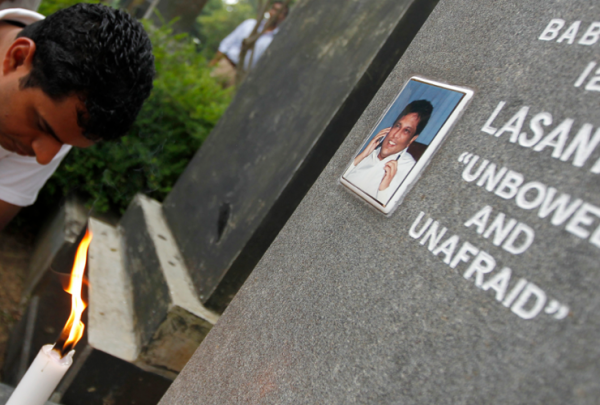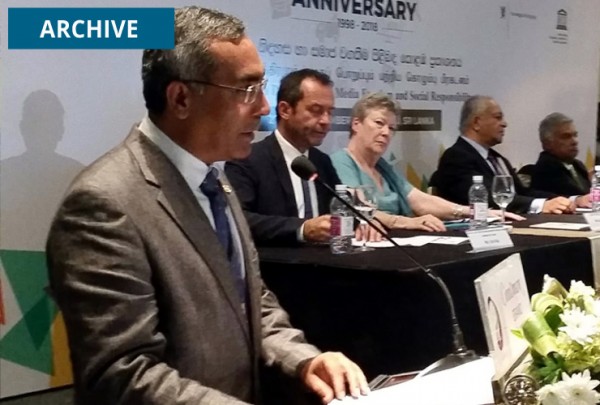One year after Tamil journalist J.S. Tissainayagam was detained without charge in Sri Lanka, the International Press Institute and other media rights organisations remain deeply worried about his continuing detention on charges of terrorism.
Marking the anniversary of his detention on 7 March 2008, the International Press Freedom Mission is calling for the unconditional release of Tissainayagam, who has been subjected to arbitrary court adjournments and is suffering ill health.
“The treatment of Tissainayagam and the use of the Prevention of Terrorism Act (PTA) against him have set an alarming precedent in efforts to silence independent voices and criticism in Sri Lanka, especially in regard to reporting on the conduct of the war in Sri Lanka,” the press freedom organisations said.
At the same time, IPI has urged the Sri Lankan government to bring to justice those who have attacked or killed journalists during the country’s long-running ethnic conflicts. Two journalists were murdered last year, and one so far this year, in the country.
“The Sri Lanakan government’s failure to deal with the impunity that exists for past crimes against journalists means that it has become apathetic to the crimes currently being committed’’. IPI Director David Dadge said. ‘‘It must break out of this cycle of callous indifference by prosecuting those who commit crimes against journalists, thereby sending a clear signal to those who would consider attacking journalists today in Sri Lanka.”
Tissainayagam, the editor of OutreachSL, and a respected columnist with the Sunday Times, was detained on 7 March 2008 by the Terrorism Investigation Division of the Sri Lankan police. He was detained as he sought to check on the welfare of his colleagues, Jasiharan and Vallamarthy, who were taken into custody the previous day.
Tissainayagam was held without charge for more than five months. Successive courts extended his detention with no explanation. During this time he was granted only sporadic access to family, legal advice and medical attention for a degenerative illness.
Court hearings were regularly postponed. Tissainayagam’s lawyers lodged a fundamental rights petition to seek interim relief, on the grounds of arbitrary arrest, torture, ethnic discrimination and a denial of equality of protection under law. It was denied.
On 25 August, indictments were issued against Tissainayagam, Jasiharan and Vallarmathy in the High Court of Colombo.
The charges were laid under the PTA, a draconian law that has remained on Sri Lanka’s statute books despite being introduced in 1979 as an ostensibly temporary measure. The Government has repeatedly rejected calls for bail.
The charges are:
• The accused together with unknown persons conspired to commit an offence by intending to cause the commission of acts of violence through inciting communal disharmony by words either spoken or intended to be read or by signs or by visible representations or otherwise, through the printing or distribution of the publication North Eastern Monthly magazine.
• An offence by the accused himself has been committed by intending to cause the commission of acts of violence through inciting racial or communal disharmony by words either spoken or intended to be read or by signs or by visible representations or otherwise, through the printing or distribution of the magazine.
• The third charge under the Emergency Regulations of 2006 relates to acting in furtherance of specified terrorist activities, (“specified terrorist activities” being defined as offences under the Prevention of Terrorism Act) by contributing or collecting or obtaining information relating to the purpose of terrorism through the collection of funds for the magazine.
The charges against Tissainayagam refer to two articles he wrote in 2006 for the North Eastern Monthly, in which he criticises the government’s military campaign and its impact on civilians.
Tissainayagam is the first Sri Lankan journalist formally charged under the terrorism act and one of less than a handful of journalists facing counter-terrorism charges in any country with a democratically elected government.
On 17 November, Tissainayagam was suddenly moved from a remand prison to the notorious Magazine Prison in Colombo, which is known for violence against Tamil prisoners. Reports at the time said he showed signs of being physically tortured.
“Tissainayagam’s health and access to necessary medical treatment remain a major concern having contracted both tuberculosis and acute infected scabies over the last number of months”, the International Mission said.
The International Mission remains committed to the release of both Tissainayagam, as well as his colleagues Jasiharan and Vallamarthy, and appeals to authorities in Sri Lanka to abide by internationally recognised standards to ensure their unconditional release.
Since 2006, the International Press Freedom Mission to Sri Lanka has conducted three missions to Sri Lanka. The mission includes and is supported by the following international organizations:
• Amnesty International
• Article 19
• Committee to Protect Journalists (CPJ)
• FreeVoice
• International Federation of Journalists (IFJ)
• International Media Support (IMS)
• International Press Institute (IPI)
• Reporters Without Borders (RSF)
• World Association of Newspapers (WAN)


